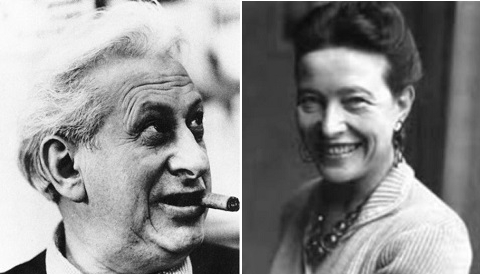
Before Ira Glass, before Terry Gross, before any number of NPR personalities and internet podcasters who these days bring us interview after fascinating interview with the great minds of our time, there was Studs Terkel. In addition to his almost superhuman achievements as an oral historian, film and TV actor, and Pulitzer Prize-winning author, Terkel pioneered the radio interview with his Chicago radio show, which ran for over four decades. “With no written questions,” an NPR eulogy tells us, Terkel would “pick up a riff and improvise.” In 1960, he brought his jazz-like improvisational style to Paris, to the apartment of existentialist philosopher and novelist Simone de Beauvoir.
You can hear their conversation, which spans nearly half-an-hour, just below. De Beauvoir talks about her middle-class upbringing, student days at the Sorbonne, and development as a teacher and writer. She narrates her life history in part because the first book of her three-volume autobiography, Memoirs of a Dutiful Daughter, had just been published, and the second, The Prime of Life, was near completion. Already well-known for her philosophical and political work with her partner Jean-Paul Sartre and fellow existentialists Maurice Merleau-Ponty and Albert Camus, and her groundbreaking feminist study The Second Sex, de Beauvoir was entering a later phase in her career, a very reflective one. Suitably, Terkel opens the interview by observing that “listeners would very much like to know how you got this way.”
“This way” refers to de Beauvoir’s fierce commitments to philosophy, and to feminism. Terkel compares her to transcendentalist and feminist pioneer Margaret Fuller, “of Boston, a century ago,” who “too traveled to various parts of the world and saw what she wanted to see, what she intended to see, the truth.” Accordingly, their conversation turns from personal reminisces to de Beauvoir’s belief that the writer must be “involved,” or—as she clarifies, “committed”—ethically, philosophically, and politically. What this means for her is “not ignoring the rest of the world.” As she puts it, “there is no possible neutrality… you have to commit yourself… and not to just be picked by people, pretending you are picked by nobody.” She goes on, in a vein reminiscent of Howard Zinn’s remark that one “can’t be neutral on a moving train”:
You are always picked one way or another way. You always help this one or this other: the poor against the wealthy or the wealthy against the poor—you have no choice. And if you pretend just to stay and do nothing, even staying and doing nothing means something and it goes to one of the camp or the other.
Intrigued, Terkel asks “I’m doing nothing, this too is a matter of choice, you say?” De Beauvoir explains: “there is only one thing: is to begin to speak yourself, your own way. You have to say ‘I am against it,’ ‘I am for it’ because if you say nothing, your silence is used by the one you are for or against.” It’s a fascinating interview first because de Beauvoir is such an engaging speaker and secondly because Terkel is such an excellent listener.
Related Content:
Simone de Beauvoir Explains “Why I’m a Feminist” in a Rare TV Interview (1975)
Photos of Jean-Paul Sartre & Simone de Beauvoir Hanging with Che Guevara in Cuba (1960)
Josh Jones is a writer and musician based in Durham, NC. Follow him at @jdmagness


First things first, this is a great article. So thank you very much Josh.
I am not much familiar with Simone De Beauvoir but through reading about Sartre, i really see how she was a complete woman and intellectual feminist. The great thing i learned from this article is when she said,“there is only one thing: is to begin to speak yourself, your own way. You have to say ‘I am against it,’ ‘I am for it’ because if you say nothing, your silence is used by the one you are for or against.”
We do not speak on some moments where we must. So when we deliver nothing but silence than we kind of get agreed to disagree which is not a good point. We should say what we really feel about our opinions. Matter of fact, HISTORY is the evidence that nobody achieved anything good or bad by not speaking anything. Excuse, my English as i am from a village of India. I’m still learning things.
I’ll be looking forward to more of Josh posts.
What a time capsule!
“Madame de Beauvior, you are an artist who calls her shots.”
Thank you. Wonderful to hear this voice!
The transcript for this piece is only accurate for the first three minutes.… after that kind of rude drivel. Very disappointing as the interview is so the opposite.